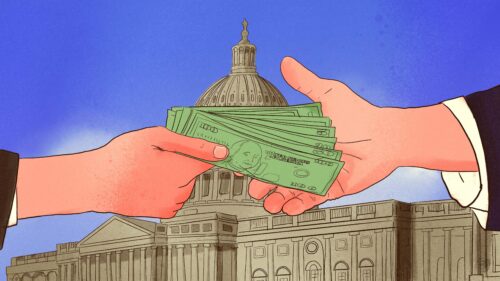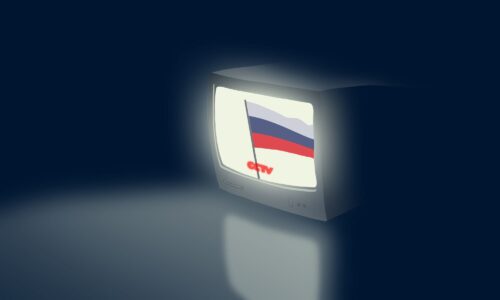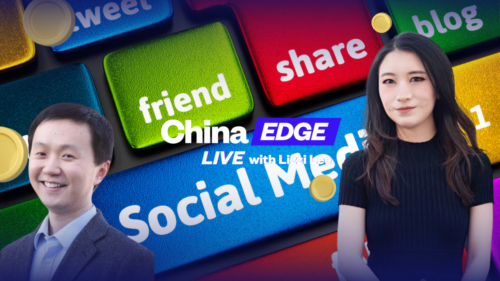Empires of lies
How Chinese and Russian state media appropriated an apocryphal Orwell quote to criticize the West.

You know things are getting Orwellian in Beijing when the Chinese Foreign Ministry appropriates an aphorism originally attributed to George Orwell — as channeled through Russian authoritarian Vladimir Putin, a freelance Russian cartoonist named Vitaly Podvitski, and two American libertarians, namely Ron Paul and his son Rand Paul, to disparage the U.S. as an “empire of lies.”
The Chinese Foreign Ministry reacted angrily to the release in late September of a U.S. State Department report entitled “How the People’s Republic of China Seeks to Reshape the Global Information Environment” in which China is accused of an “undeclared information war” that uses “deceptive and coercive measures…pushes authoritarianism [and] promotes propaganda” while “actively establishing authoritarian digital norms.”
The Foreign Ministry, its pique evident in its pithy choice of words and in the semi-hysterical tenor of its reply, responded in top form:
Facts have proven time and again that the U.S. is an “empire of lies” through and through. Even some in the U.S., such as Senator Rand Paul, acknowledged that the U.S. government is the greatest propagator of disinformation in the history of the world.
State wordsmiths set the tone and content for propaganda, both in the original and in translation. Although this was a diatribe crafted inside the halls of the Foreign Ministry, it quickly got the seal of approval of the official Xinhua News Agency, which reproduced it verbatim and sent it flying to key external media in its vast distribution system.
State media outlets such as the Global Times — a nationalistic subsidiary of the Communist Party’s People’s Daily newspaper that is dedicated to angry coverage of world affairs in English and Chinese — and the China Daily — a state-owned English publication that has a key role to play in “telling China’s story well” to diplomats and other residents of China — added to the Foreign Ministry outrage with additional spittle-flecked words, but the Foreign Ministry’s term “empire of lies” was a gem of assonance, a memorable rhetorical flourish. The term is used in English as well as in Chinese, translated literally as 谎言帝国 huǎngyán dìguó, which echoes the term “empire of hacking” (黑客帝国) that state media used to describe the U.S. after the Edward Snowden revelations of 2013.
As if to buttress the notion that China trades in facts while the U.S. shamefacedly lies, there’s even a half-hearted attempt to source the “empire of lies” jab to Rand Paul, a U.S. senator representing Kentucky.
Where does “empire of lies” come from?
The Foreign Ministry made the perhaps understandable mistake of conflating libertarian father with libertarian son, for it is père Ron Paul, a physician and former congressman from Texas, not Rand Paul, who launched the term “empire of lies” as a descriptor for the United States in his 2008 book, The Revolution: A Manifesto.
It’s also telling that the Chinese media was careful to lift only half the Rand quote in question, which in the original reads: “Truth is treason in the empire of lies.”
In China, where truth is sometimes literally and legally construed as treason when it comes to criticizing Xí Jìnpíng 习近平 or the Communist Party or in shedding light on certain historical events, the first half of the quote cuts uncomfortably close to home.
In The Revolution: A Manifesto, Ron Paul attributes his pungent quote to George Orwell, without a clear citation. (There is no published evidence that Orwell himself said “Truth is treason in the empire of lies.”)
So where did China’s wordsmiths find this pseudo-Orwellian gem? “Empire of lies” is traceable to Ron Paul’s 2008 book, and “the greatest propagator of disinformation” is attributable to his son Rand at a May 2022 Senate hearing described by the U.S. government as “the greatest propagator of disinformation in world history.”
But there’s another possible source for the empire of lies meme that is even of more immediate relevance to China’s wolf warrior diplomats: On February 24, 2022, Vladimir Putin gave a speech announcing that his armies would invade Ukraine in what he called “a special military operation” in which he castigated the U.S. as an “empire of lies.” He went on to assert:
One can say with good reason and confidence that the whole so-called Western bloc formed by the United States in its own image and likeness is, in its entirety, the very same “empire of lies.”
Putin does not credit either Rand Paul or Ron Paul for the quote, but he deems it an American creation: “U.S. politicians, political scientists and journalists write and say that a veritable ‘empire of lies’ has been created inside the United States.”
This term now has a life of its own in Russian media, and Chinese media, which sometimes takes its cues from the Kremlin, echoes this, especially on Ukraine-related matters. The U.S. has been tagged “an empire of lies” numerous times in the last year or so, sometimes in relation to spurious Russian propaganda about secret bio-labs, germ warfare, and COVID origins, but also in cases of documented deceit, such as in the run-up to the war in Iraq.

Last year, a cartoon entitled “Empire of Lies” ran in the Global Times. Penned by Russian artist Vitaly Podvitski, whose work has appeared in Sputnik News, RIA Novosti, and Channel One Russia, it portrays a sad, hook-nosed Uncle Sam pouring toxic ooze from a garbage can labeled “lies” on Xinjiang to discredit China.
Another Russian, Foreign Minister Sergei Lavrov, is also fond of the term. He described the entire West as an “empire of lies” on Chinese state broadcaster CCTV news last month, among other occasions.

There are several books with the title “Empire of Lies.” mostly in the realm of dystopian fiction, but there is also a political critique of U.S. foreign policy published in March this year by right-wing contrarian and economist Paul Craig Roberts who points to 9/11, COVID-19 and the war in Ukraine as examples of key U.S. deceptions.
There is another possible source of the endurable and enduring “empire of lies” meme, as ironic as it is unlikely. It’s the title of a book about China, published in 2008 by the erudite French-American author Guy Sorman who first visited China in 1967: Empire of Lies: The Truth about China in the Twenty-First Century.
Writing back when the Western honeymoon in China was not yet over, Sorman argued the West conferred greater legitimacy on China than did the Chinese themselves, which gives an insight into why the Chinese media likes to quote foreigners so much.
The uncertain origin of the phrase “empire of lies” adds another Orwellian twist to this already twisted matter. It certainly sounds like something Orwell would have said or could have said, and you can buy T-shirts (from libertarian-orineted stores) with the quote on it attributed to Orwell, but there is no reliable scholarship that confirms Orwell said or wrote it.
What would the human truth-seeking missile called Orwell have to say about a quote attributed to him that he never made, that has now gone around the world several times, getting reinvigorated and repurposed by authoritarian governments in Russia and China?





